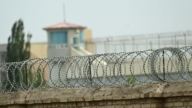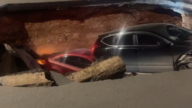【新唐人2012年6月7日訊】5號,中國環境保護部副部長吳曉青在新聞發佈會上說,個別國家駐華領事館自行開展空氣質量監測,並經互聯網發佈空氣質量信息,這樣做在技術上既不符合國際通行的要求,也不符合中國的要求,外交人員不能幹涉中國內政。6號,美國國務院回應說,不會因為中國的指責就停止發佈數據,如果中國也發佈美國城市的空氣質量數據,美國不會反對。
6月5號「國際環境日」,中共國務院舉行新聞發佈會,中國環保部副部長吳曉青就「美國駐華使領館監測PM2.5併發佈相關數據」表示,「中國空氣質量監測及發佈,涉及社會公共利益,屬政府的公共權力」。因此,個別駐華使領館自行開展空氣質量監測,並從互聯網發佈空氣質量信息,既不符合維也納有關公約,也違反了環境保護的有關規定。
他說,根據維也納有關公約,外交人員有義務尊重當地國家的法律法規,不能幹涉當地的內政。
自2008年以來,美國駐北京大使館通過推特帳戶@BeijingAir,以每小時更新一次的方式,連續發佈空氣懸浮顆粒PM2.5的監測數據。目前已經有超過1萬9千名網友跟蹤關注。
「中國人民大學」教授毛壽龍在微博回應說,「根據國際法,美國大使館及其上空屬於美國的領土和領空,所以,美國大使館檢測和公布其空氣污染指數,不是干涉內政。我們批評美國大使館檢測數據,才是干涉美國內政。」
大陸律師李天天指出,把美國使館對空氣質量的監測上升到「干涉中國內政」的政治高度,實在太荒謬。
李天天:「這事關老百姓健康的空氣,應該有更先進的一個國家給監測,應該是好事情,可它們竟然反對,還提到那麼高的高度,可見它們根本不是為人民服務的。如果是一個好的政府,正常的政府歡迎還來不及呢,只有黑幫政府才害怕真相暴露。」
吳曉青還說,中國將進一步加大監測信息發佈力度,從今年下半年開始,74個城市所有國控監測點,都將陸續發佈更加全面的空氣質量監測信息。他要求外國駐華使領館停止發佈自測的空氣質量信息。
6號美國國務院回應說,美國發佈的數據只是為在中國的美國公民提供信息,沒有干涉中國內政,因此不會停止發佈相關數據。如果中國也發佈美國城市的空氣質量數據,美國不會反對。
當天,中共外交部發言人劉為民主持例行記者會就此事回應,中國沒興趣監測併發佈美國PM2.5。
中國環保部門只公布顆粒直徑較大的可吸入顆粒物PM10監測結果。事實上,直徑在2.5微米以下的「顆粒」 PM2.5,可以進入肺部甚至血液循環系統,對人體健康損害更大。
李天天表示,如果不是美國大使館在Twitter發佈PM2.5監測數據,並且在網上流傳,中國民眾恐怕永遠都不會知道PM2.5是甚麼。
李天天:「這個事情共產黨就要不高興,只說明它們平時就沒有告訴過老百姓真相,更不告訴人家外國人真相,人家只好自己監測唄。更可笑的是,中國民眾根本不相信自己的政府而相信外國政府,它自己覺得沒面子,然後它就不高興,從來不想著自己去改正錯誤」
李天天指出,中國五分之四的城市空氣質量達不到環保部門新制定的質量標準。灰霾天氣不僅北京有,整個京津冀地區、長江三角洲、珠江三角洲等地的居民,每年有30%-50%的時間都生活在灰霾天氣中。
採訪編輯/李韻 後製/葛雷
Air-Quality Data Release by
U.S. Embassy in China Illegal?
June 5, Wu Xiaoqing, Vice Minister of Environmental
Protection of the Chinese Communist Party (CCP)
accused foreign embassy in China of
monitoring air-quality data and releasing the result.
Wu asserted that the practice does not conform to international
conventions, nor is it in line with China’s regulations.
Diplomatic personnel cannot interfere with China’s
internal affairs, Wu claimed.
June 6, the U.S. State Department responded by saying that
the U.S. will not stop releasing its air-quality monitoring data in face of criticisms by the CCP regime.
And that the U.S. would not object if China were to publish
the air quality data of American cities.
。
On June 5, World Environment Day, at a news conference,
the CCP』s Vice Minister of Environmental Protection Wu
Xiaoqing criticized the U.S. Embassy in China’s releasing
PM2.5 air-quality data.
Wu said, the monitoring and result release of the air quality
in China, which involves the public interest, is within the public power of the government.
Wu accused foreign embassies and consulates in China of
monitoring and publishing on internet their own report on air quality in China,
which does not abide by the relevant Vienna Conventions,
nor by environmental protection regulations.
Wu Xiaoqing claimed, based on international conventions,
diplomats are obligated to respect local laws and
regulations in the host countries, and cannot interfere with internal affairs locally.
Since 2008, the U.S. Embassy in Beijing has released hourly
readings of Beijing’s air quality via Twitter.
The Twitter account @ BeijingAir has thus far attracted
over 19,000 netizen followers.
Mao Shoulong, professor at Renmin University of China,
echoed this in his Microblog, saying, “Under international law,
the U.S. Embassy and the sky above is the U.S. territory
and airspace.
So, the U.S. Embassy’s air-quality testing and data release
did not interfere with the internal affairs (of China).
But our criticism of the U.S. monitoring air-quality data was
just interference with the domestic affairs of the U.S.”
China’s lawyer Li Tiantian thinks it so ridiculous that
the CCP politicized the U.S. Embassy’s air-quality monitoring.
Li Tiantian: “The air quality is related to Chinese civilians.
It is good that a developed country tested it for us.
But the (CCP) authorities openly opposed it and even politicized
this issue, showing they have never served the people.
A good and normal government would welcome it, I think,
only a gangster-government fears the truth being exposed."
Wu Xiaoqing said that China will further increase efforts
on data release of air-quality monitoring.
Since the second half of this year, all state-controlled monitoring
stations in 74 cities will release their monitoring reports.
Wu asked the foreign embassies and consulates to stop
publishing air-quality data “which is not representative".
In response, the U.S. State Department stated on June 6 that
the data released by the U.S. is simply to provide information
for American citizens in China, and is not interference in China』’s internal affairs.
Therefore, the air-pollution data release will not be discontinued.
If China were to report the U.S. cities’air quality the U.S. would not object.
The same day at a regular press conference, the CCP’s
Foreign Ministry spokesman Liu Weimin responded that
the (CCP) regime has no interest in monitoring and releasing
air quality data of the United States.
In China, the environmental protection departments only
publish PM10-monitoring results.
While particles of less than 2.5 microns in diameter (PM2.5),
which can enter the lungs and circulatory system,
are believed to pose more health risks.
Li Tiantian remarks that if not for the U.S. Embassy’s
releasing of PM2.5 monitoring data via Twitter,
the Chinese people might never know what PM2.5 is.
Li Tiantian: “The CCP just presents itself as unhappy
on this issue.
This only shows that they’ve never told the truth of it
to the public in our daily lives, nor to foreign countries.
So that’s why the foreigners monitored it on their own.
More ridiculous, the Chinese people don’t trust China’s
government but do trust the foreign one—a loss of face to it.
So it was disgruntled but never thought of
correcting its mistakes."
Li Tiantian points out that air quality in four-fifths of
China’s cities are sub-standard.
Each year, in the entire Beijing-Tianjin-Hebei area,
the Yangtze River Delta, the Pearl River Delta, among others,
haze weather accounts for 30% -50% of the
time of any period.




























